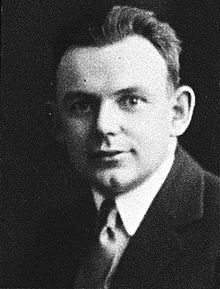Loading AI tools
New Zealand politician From Wikipedia, the free encyclopedia
George Charles Cecil Black (21 November 1903 – 17 October 1932) was a member of the House of Representatives for Motueka electorate, in the South Island of New Zealand, initially as a representative of the United Party and from early 1931 as an Independent. He committed suicide and was succeeded as MP by Keith Holyoake.
George Black | |
|---|---|
 | |
| Member of the New Zealand Parliament for Motueka | |
| In office 14 November 1928 – 17 October 1932 | |
| Preceded by | Richard Hudson |
| Succeeded by | Keith Holyoake |
| Personal details | |
| Born | George Charles Cecil Black 21 November 1903 Reefton, New Zealand |
| Died | 17 October 1932 (aged 28) Makara, New Zealand |
| Political party | United |
Born in Reefton on 21 November 1903, Black was the son of George James and Marianne Catherine Black.[1][2] In 1923, Black became a Parliamentary Clerk of Committees.[1]
| Years | Term | Electorate | Party | ||
|---|---|---|---|---|---|
| 1928–1931 | 23rd | Motueka | United | ||
| 1931 | Changed allegiance to: | Independent | |||
| 1931–1932 | 24th | Motueka | Independent | ||
Black represented the Motueka electorate in the House of Representatives from 1928 to 1932.
In the 1928 election, aged only 24, he stood as a United Party candidate and follower of Sir Joseph Ward and was successful.[3] He unexpectedly beat the Reform Party incumbent of 14 years,[4] Richard Hudson, and became the youngest MP at the time.[1] He was appointed junior whip by the United Party.[5]
In Parliament, Black refused to support the Finance Bill that proposed cuts to public service salaries and voted with the Labour Party,[6] and in January 1931 he also opposed the decision to suspend construction of the Kawatiri–Inangahua railway line that ran through his electorate.[7][8] Black was expelled from the United Party the day after voting against the Finance Bill in March 1931, saying that "no genuine supporter of the late Prime Minister", Sir Joseph Ward, could uphold such measures.[9]
Later in the year, at the 1931 election, the bright and well-regarded local MP was elected as an independent. He was associated with Harry Atmore, the independent MP for the neighbouring Nelson electorate.[10]
On 17 October 1932 aged 28, Black committed suicide with cyanide poison at Mākara Beach.[5][11] He was survived by his wife and their child.[5] The coroner found that Black had been mentally unstable for some months, and was also in financial difficulties.[11]
Black's death triggered the 1932 Motueka by-election, which was won by Keith Holyoake.[12]
{{citation}}: CS1 maint: year (link)Seamless Wikipedia browsing. On steroids.
Every time you click a link to Wikipedia, Wiktionary or Wikiquote in your browser's search results, it will show the modern Wikiwand interface.
Wikiwand extension is a five stars, simple, with minimum permission required to keep your browsing private, safe and transparent.